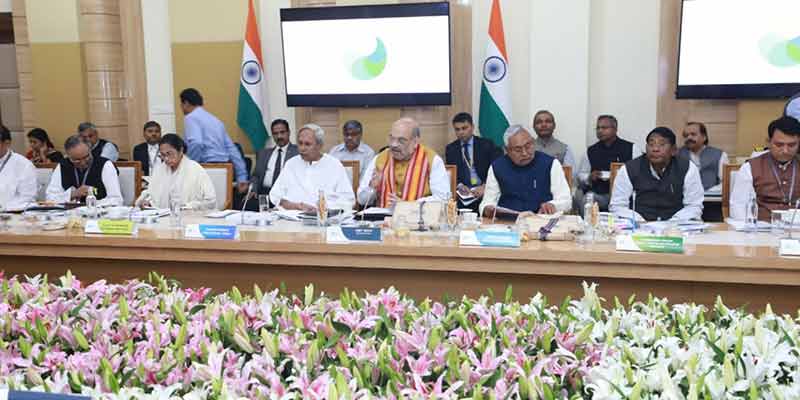Syllabus:
GS2: Functions and responsibilities of the Union and the States, issues and challenges pertaining to the federal structure, devolution of powers and finances up to local levels and challenges therein.
Context:
Recently, the union Home Minister and Minister of Cooperation chaired the 27th meeting of the Eastern Zonal Council in Ranchi, Jharkhand.
More on the News
- The 27th Eastern Zonal Council meeting discussed key national issues, including FTSCs for rape cases, village-level banking access, ERSS-112 rollout, and regional concerns like nutrition, education, health, power, and urban planning.
- The Union Home minister reiterated the Prime Minister’s vision of “TEAM BHARAT,” stressing cooperative federalism as a cornerstone for achieving India’s development goals by 2047.
- The number of zonal council meetings rose to 63 between 2014 and 2025 as compared to 25 between 2004 and 2014.
- Highlighting its significance, minister added that zonal councils have transformed from being mere discussion forums into “engines of cooperation”, noting that 83% of issues taken up in their meetings have been resolved.
- The meeting resolved key issues like the Masanjore Dam, Taiyabpur Barrage, Indrapuri Reservoir, and PSU asset division, highlighting the council’s role in conflict resolution.
Origin of Zonal Council
- The concept of Zonal Councils was proposed by Prime Minister Jawaharlal Nehru in 1956 during debates on the States Reorganisation Commission’s report.
- He recommended grouping states into four or five zones with Advisory Councils to promote cooperative working, according to the Ministry of Home Affairs.
- In the light of the vision of Pandit Nehru, five Zonal Councils were set up as per the States Reorganisation Act, 1956.
Composition of Zonal Council
- Northern Zonal Council: Haryana, Himachal Pradesh, Jammu & Kashmir, Punjab, Rajasthan, National Capital Territory of Delhi and Union Territory of Chandigarh.
- Central Zonal Council: Chhattisgarh, Uttarakhand, Uttar Pradesh and Madhya Pradesh.
- Eastern Zonal Council: Bihar, Jharkhand, Orissa, and West Bengal.
- Western Zonal Council: Goa, Gujarat, Maharashtra and the Union Territories of Daman & Diu and Dadra & Nagar Haveli.
- Southern Zonal Council: Andhra Pradesh, Karnataka, Kerala, Tamil Nadu and the Union Territory of Puducherry.
- North Eastern Council was set up under the North Eastern Council Act, 1972 with Assam, Arunachal Pradesh, Manipur, Tripura, Mizoram, Meghalaya and Nagaland as its members.
- Each Zonal Council has a Standing Committee consisting of the Chief Secretaries of the member states. These Standing Committees meet from time to time to resolve the issues or to do the necessary groundwork for further meetings of the Zonal Councils.
The composition of each council is as follows:
- The Union Home Minister is the chairman of each of these councils.
- The Chief Ministers of the states included in each zone act as Vice-Chairman of the Zonal Council for that zone by rotation, each holding office for a period of one year at a time.
- The Chief Minister and two other ministers, as nominated by the Governor from each of the states and two members from Union Territories included in the zone.
- One person nominated by the planning commission for each of the Zonal Councils, the Chief Secretary and another officer nominated by each of the states included in the Zone.
- In 2018, the Union Cabinet approved the nomination of the Union Home Minister as ex-officio chairman of North Eastern Council and the Minister of Development of North Eastern Region (DoNER) to serve as Vice Chairman of the Council.
Role of Zonal Council
- The Zonal Councils provide an excellent forum where irritants between the Centre and States and among States can be resolved through free and frank discussions and consultations.
- The councils act as regional forums of cooperative endeavour for states linked with each other economically, politically and culturally.
- Zonal councils address shared issues like economic and social planning, border disputes, inter-state transport, linguistic minorities, and state reorganization.


